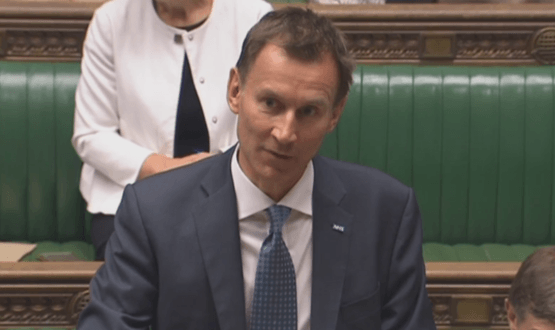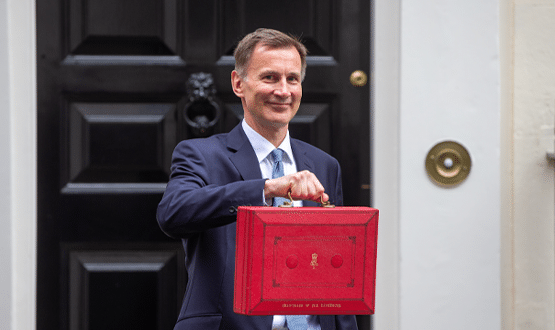NHS digitisation means mail blunder “unlikely” to occur again, Hunt tells Commons
- 27 June 2017

The shift to electronic systems will mean the blunder that saw 709,000 items of medical correspondence not delivered is “unlikely” to occur again, according to the health secretary.
Jeremy Hunt faced an urgent question about the debacle in the House of Commons on Tuesday, following the publication of a damning National Audit Office (NAO) report that said at least 1,700 cases of potential patient harm have been identified, with investigations continuing.
“[It is] unlikely this will happen again because this is about paper correspondence”, said Hunt, who said the NHS is “recently moving all the transfers of communication to electronic systems”.
The NAO report said it expects the figures of potential patient harm to rise from 1,788 as a third of GPs still have not returned their findings from the investigation.
Hunt emphasised the importance of digital records, but added paper still forms an important back up.
“The future is to transport patient records securely over electronic systems. It’s much quicker and there’s much less room for error, but you do also need the back up systems.”
Hunt was grilled in the Commons over the shambles that saw hundreds of thousands of undelivered letters and clinical correspondence pile up in NHS warehouses over a five-year period, including child protection notes, medical records and changes to medication, left languishing in a warehouse.
NHS Shared Business Services (NHS SBS) was contractually obliged to provide the service, but during 2011 and March 2016 a backlog built up, where it increased from 8,000 to 435,000 items. The final figure of 709,000 was confirmed when more boxes were found.
Hunt said the investigation into the scandal will be completed by Christmas 2017.
Jonathan Ashworth, Labour MP for Leicester South, described the stacking up of medical mail as an “absolute scandal”.
Speaking in the Commons Ashworth described the incident as a: “Shambolic catalogue of failure that took place on the secretary of state’s watch.”
Hunt admitted that “what happened at SBS was totally unacceptable”, and said that better assurances on contracts being delivered needed to be guaranteed.
It was reported in the NAO’s publication that NHS England estimated the administration costs alone will be £6.6 million.
Hunt said SBS will be “paying their fair share of the costs that has been incurred as a result of this wholly regrettable incident”.
An investigation by the Information Commissioner’s Office (ICO) is on-going, and the independent authority provided a statement to Digital Health News that said:
“The ICO is currently monitoring the remedial action taken by the NHS to resolve the historic problems. Our investigation is ongoing and as part of that will be to consider a clinical review which is expected later this year.”
NHS SBS is co-owned by the Department of Health and the French company Sopra Steria. Its main business is managing supplier contracts on the behalf of the NHS with revenues of about £87 million for these services.
The Department of Health has a 49.99% share in the NHS SBS.





11 Comments
My understanding is it’s around patient had moved or addressed to wrong practice (spine, GP or hospital having wrong demographics, etc).
This also happens with electronic systems, lab and radiology reports get delivered to wrong practice.
It’s designed to mimick the post system and so has the same faults. We need to rethink the solution and look at better solutions (such as care providers providing external access to records via an API?)
Have the root causes been published yet? I can name quite a few based on past experiences in diagnostics and this is happening electronically too.
Patient’s matched with the wrong/locum referrers, GPs in health centres not passing in correspondence to the surgery literally next door, Spine not being up to date etc (running asynchronously and overwriting data that was correct).
So much correspondence goes missing, gets mixed up and often goes unreported. Infuriatingly the ICO also does not act either.
Even email offers a more robust approach to communications and audibility than this absolute shambles of an operation.
Yet, if you mention email you get shut down by the paranoid job creationists “it’s not secure”, what if someone is on holiday, etc ,etc.
Guess what!? The post is not secure and 1000’s of the document just turned up in boxes in some warehouse.
Ask 100,000 patients whose care has been compromised as a result of stupid blunders like this whether they would prefer you to use email or bits of paper. In fact, stuff that, ask any sensible human being who doesn’t work in the NHS.
Why the NHS hasn’t adopted robust CRM solutions is beyond me. Their processes are lacking and driven primarily by pushing comunications from pilar to post so t is no onwder people get lost in the system.
With the EU GPDR coming into force next year, providers will be forced to provide structured data to patients (via API’s) and so the patient can ensure their care providers see their documents (on their own iPhones).
If a bug in your IT system (or incorrect operation of that system) means the letter doesn’t get printed in the first place there is no evidence except a few electrons in the wrong place. And of course that can still happen with electronic reports being sent out (or not being sent as the case may be).
humans are the weakest link in any system.
…and that there is exactly the attitude that has prevented the NHS from being digitised decades ago. The fear of the potential of the possibility of a chance of an issue has for far too long been used as a reason not to progress.
I’m so glad the NHS is no longer sending letters, paper files, and faxes around the country any more… oh wait.
So we’re moving to electronic systems.
Sure i’m not the only one who thinks this should have been done 20 years ago and 10 years ago we should have mandated the sharing of (electronic) documents stores so this problem could never have happened.
Roll on paperless 2020!
… but if it DOES happen again it will be much harder to detect and much easier to cover up?
The sad truth is that this same problem has been happening at smaller scale, but constant pace forever.
Comments are closed.